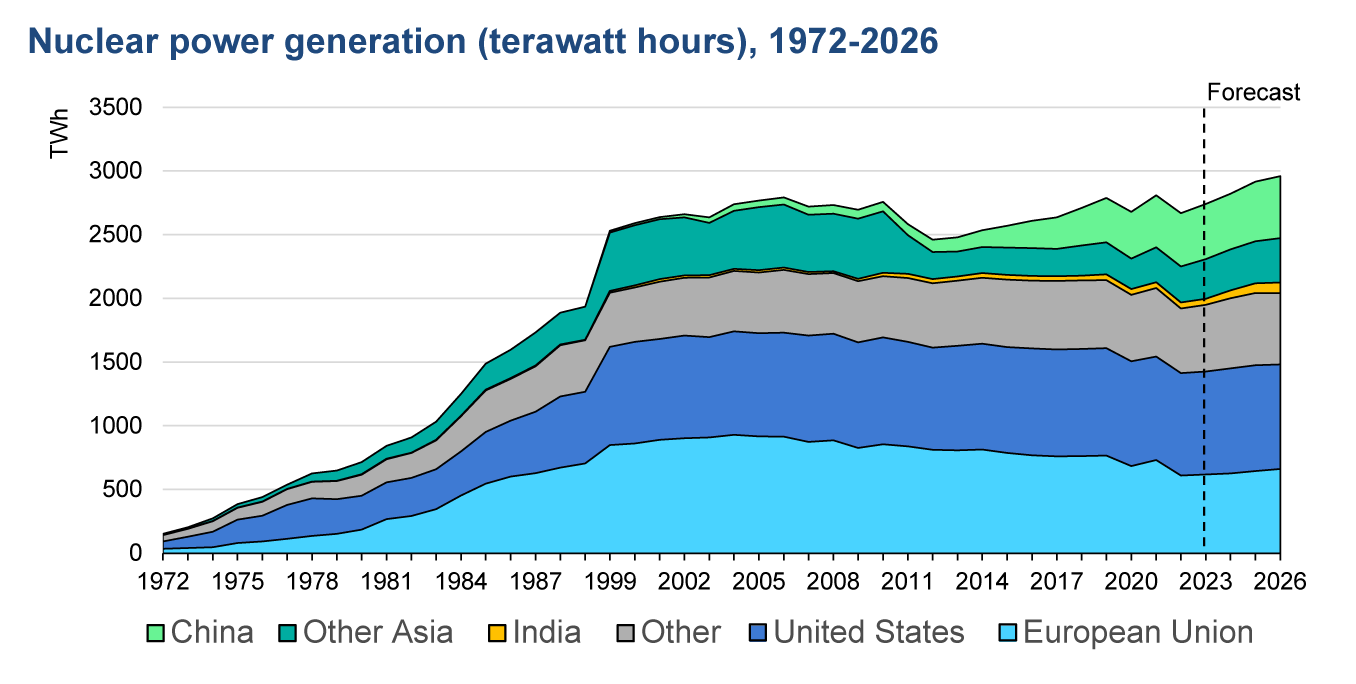AI Gets Political
Plus: Israel’s day in court. Eric Schmidt’s killer drone project. Biden = Trump on foreign policy? Nuclear power surge.
Note: You can watch or listen to Bob and NZN staffer Andrew Day discuss items from this week’s Earthling on the Nonzero Podcast.
America’s election year is young, but it’s already showing that various conjectured effects of AI on politics are now more than mere conjecture.
1. Deep fakes. In the run-up to Tuesday’s Democratic primary, New Hampshire residents received robocalls that sounded like Joe Biden urging them not to vote until the general election. The voice had been generated by an AI (of unknown provenance), apparently for the purpose of hurting Biden’s campaign.
2. Fake deep fakes. Last month, after Fox News aired an anti-Trump ad featuring an authentic video of the former president struggling to pronounce “anonymous,” he condemned “the perverts and losers” he said had used AI to make him look bad. As the Washington Post notes, other politicians around the world are also taking advantage of the “plausible deniability” afforded by the possibility that seemingly real video and audio is fake. Some observers worry about impending epistemic tumult; AI “destabilizes the concept of truth itself,” said one disinformation analyst quoted by the Post. Trump’s mass deployment, during his presidency, of the “fake news” charge may have been ahead of its time.
3. Bots as force multipliers. What if you were a political candidate who could magically converse with an unlimited number of voters, one-on-one, at the same time? Dean.Bot—created by a super PAC that supports long-shot Democratic presidential candidate Dean Phillips—was, as of last week, poised to become the closest thing we’ve had to that. But then Dean.Bot got unplugged. OpenAI, citing its rules on political campaigning, suspended the bot developer’s account. (This sidelining happened in spite of Dean.Bot’s impressive political connections; one of the founders of the super PAC that created it had previously been OpenAI CEO Sam Altman’s chief of staff.)
4. Bots as invisible force multipliers. Dean.Bot may herald a coming age of surrogate candidate bots, but so long as they’re labeled as such, how bad would that be? More insidious would be armies of incognito bots—bots that seem to be living, breathing social media denizens but are preternaturally adept at persuasion or provocation or disinformation or whatever tactical goal they’re pursuing. We haven’t seen any articles about incognito bots in this campaign. Then again, part of the point of going incognito is that you don’t get articles written about you! Future elections could be won by the candidate with the most ingeniously engineered invisible army. Silicon Valley may become the epicenter of American political consulting.
5. Bots as brain implants. The Washington Post reports that supporters of Israel’s war effort in Gaza are using tools that “generate AI-written suggested responses to posts online, allowing users to flood the comments of pro-Palestinian posts with pro-Israel messaging.” This technology may not sound all that different from a list of talking points, but it’s a less blunt instrument than that, and so a more effective one—and a less conspicuous one; when each response is artisanally crafted by an AI for the occasion, it’s harder to distinguish between spontaneous grassroots activism and orchestrated Astroturf activism.
How exactly to guard against the worst effects of AI on politics is unclear. Government regulation raises tough questions, ranging from questions about free speech to the question of whether a government that’s constantly scurrying to avoid debt default is capable of making good policy anyway. And if you’re hoping that OpenAI, Google, and other such AI powers will responsibly restrict the actions of their AIs: Well maybe, but it’s not clear how much that matters now that companies like Meta and Mistral are pushing powerful open source AIs (which are easier to customize and whose guardrails are easier to dismantle). Maybe we should appoint a bipartisan commission to study the problem and agree that we’ll all spend a lot less time online until it figures the whole thing out.
The world’s nuclear power output will set a new record next year and will keep growing in 2026, according to projections in the International Energy Agency's latest report on the global electricity market. Asia is driving much of the growth.
Other findings: Nuclear and renewables—the two kinds of power that don’t create much in the way of greenhouse gases—will together generate 46 percent of global electricity by 2026, up from 39 percent last year. By early 2025, renewables should overtake coal as a power source, providing more than a third of electricity worldwide, thanks largely to the decreasing cost of solar power.
Five Gaza War Updates:
The US will send CIA director William Burns to the Middle East to try and broker a deal that could lead to the release of all hostages in Gaza and a cessation of hostilities there, the Washington Post reports. Burns, who has served as ambassador to Jordan and to Moscow and as assistant secretary of state for Near Eastern affairs, is considered by many to be a more seasoned and effective diplomat than Secretary of State Antony Blinken.
In a preliminary ruling on South Africa’s claim that Israel is committing genocide in Gaza, the International Court of Justice ordered Israel to work hard to minimize civilian casualties and “take immediate and effective measures to ensure the provision of urgently needed basic services and humanitarian assistance." By deciding to pursue the case further, the court is deeming the genocide charge plausible. But whether the charge is proved will take the court months if not years to determine. The court also ordered Israel to “prevent and punish” incitements to genocide—and cited statements by various Israeli officials that could be construed as incitements to genocide. But the court didn’t order a ceasefire, as pro-Palestine activists, in particular, had hoped.







